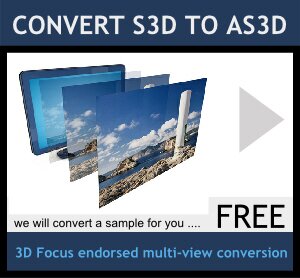What people really think about 3D TV – Survey results in!
3D Focus recently conducted a series of polls to understand the public’s thoughts about 3D entertainment.
We are delighted to now reveal the results as part of our MIPTV coverage sponsored by 3D specialists Presteigne Charter.
We must emphasise this was not a ‘scientific’ survey. The questions were only published on 3dfocus.co.uk – a website likely to attract readers possibly more interested in 3D than the average person! However, certain questions took this into consideration and reveal interesting results. Aside from one question, each question only allowed one vote per person so each vote is unique.
1 – Do you think 3D will become truly ubiquitous? (ATM screens, portable DVD players, websites etc.)
772 people responded…
377 – Yes (49%)
290 – No (38%)
105 – Don’t Know (13%)
We believe that S3D will not become truly ubiquitous even if glasses free 3D technology reaches a level of incredible quality because a lot of applications simply do not require it – what benefit would 3D offer an ATM display for example?
The majority of Nintendo 3DS owners play their glasses free 3D handheld console in 2D mode and, aside from LG, no mobile phone manufacturers are releasing new 3D phones (for now) with Samsung recently confirming they have no intention to release a glasses free 3D tablet despite the rumours. This might be because LG’s Optimus 3D phone did not achieve the sales numbers expected (nor did the HTV EVO 3D) and there is no evidence to suggest the public will regularly use the 3D functionality of any device that supports the feature. The glasses free 3D quality of the LG Optimus 3D and HTC EVO 3D is actually rather good but the question is, where is 3D best utilised? Smartphone owners use their device to check emails, surf the web, look at Facebook and the occasional video clip; all of which are not particularly enhanced by 3D after the initial curiosity factor.
We expect, in the short to medium term, 3D will always remain a niche medium, suitable for occasional 3D films, 3D television events and gaming. Unless evidence is there to suggest people will pay a premium for 3D, platform owners and broadcasters will not be rushing to offer 3D content anytime soon. However, 3D is likely to become more integrated into people’s lives when new, currently non-existing technology can provide a 3D experience, without glasses and without sweet spot viewing zones. It is unlikely television; computers and gaming will stop evolving beyond Super Hi-Vision (expected to be in the home by 2020). 3D is the most natural step after higher definition but some would argue that 3D technology has been released to the public too early. Comment that 3D is over and that the public do not desire the feature is short-termism. It can be easy to forget that 3D TVs only became available for consumers in 2010. The PlayStation 3 only became 3D capable in 2010. This is the start of a long transition but 3D everywhere on every device? We doubt it.
2 – Do you think 3D warrants the price premium in the cinema?
783 people responded…
136 – Yes (17%)
273 – No (35%)
374 – Yes if shot in 3D but no if converted (48%)
![]() We believe that 3D does warrant a price premium in the cinema regardless of whether a film is converted or not. 'John Carter', despite receiving generally negative reviews, looked great in 3D and was 100% converted. 'Titanic 3D' proves that conversion can look just as good as a film filmed with stereo cameras and even 'Avatar' contained many converted shots as did Michael Bay’s 'Transformers: Dark of the Moon'. 'Hugo', regarded by many as the best example of intelligent 3D, was considered by most a better film in the 3D format and it would be difficult for anyone to deny that 'Cirque Du Soleil 3D', released later this year, is not a better film in 3D.
We believe that 3D does warrant a price premium in the cinema regardless of whether a film is converted or not. 'John Carter', despite receiving generally negative reviews, looked great in 3D and was 100% converted. 'Titanic 3D' proves that conversion can look just as good as a film filmed with stereo cameras and even 'Avatar' contained many converted shots as did Michael Bay’s 'Transformers: Dark of the Moon'. 'Hugo', regarded by many as the best example of intelligent 3D, was considered by most a better film in the 3D format and it would be difficult for anyone to deny that 'Cirque Du Soleil 3D', released later this year, is not a better film in 3D.
If a 3D film has been well produced and uses the 3D to create a more dynamic film, there is no reason that a premium can’t be justified. However, as a recent report suggested, the price of 2D films could increase resulting in little differences between each version.
3 – How important will 3D be in your next computer choice?
750 people responded…
152 – Essential (20%)
217 – Would be nice to have (29%)
234 – Won’t have any influence in my decision (31%)
147 – Only interested if it was a glasses free 3D computer (20%)
![]() The poll suggests 3D is an appealing feature for people looking to buy a laptop and we would agree. We do not believe it to be essential but certainly nice to have, especially with dual glasses free/glasses required 3D functionality. 3D could be essential for people involved with CAD design and healthcare applications. Many laptops can already be upgraded to glasses free 3D with SpatialView’s 3DScreen which does a good job at providing a 3D effect but again, current glasses free 3D technology reduces resolution considerably and it is a big ask to expect people to give up on high definition for 3D. We expect 3D computers will be suitable for 3D gaming and video playback but do not expect a time when websites and general applications will be frequently viewed in 3D mode. Toshiba have released an eye tracking glasses free 3D lenticular laptop called the Toshiba Satellite P855 and there is an increasing range of 3D laptops and tablets becoming available in China.
The poll suggests 3D is an appealing feature for people looking to buy a laptop and we would agree. We do not believe it to be essential but certainly nice to have, especially with dual glasses free/glasses required 3D functionality. 3D could be essential for people involved with CAD design and healthcare applications. Many laptops can already be upgraded to glasses free 3D with SpatialView’s 3DScreen which does a good job at providing a 3D effect but again, current glasses free 3D technology reduces resolution considerably and it is a big ask to expect people to give up on high definition for 3D. We expect 3D computers will be suitable for 3D gaming and video playback but do not expect a time when websites and general applications will be frequently viewed in 3D mode. Toshiba have released an eye tracking glasses free 3D lenticular laptop called the Toshiba Satellite P855 and there is an increasing range of 3D laptops and tablets becoming available in China.
4 – What are your perceptions of 3DTV? (People could tick more than once so no percentage is provided)
532 voters responded and each voter was able to select more than one option.
Sets are expensive – 173
There is nothing/very little to watch on them – 247
3D services are too expensive – 187
Poor compared to cinema experience – 64
Finally affordable – 141
Glasses are too expensive – 177
Technology has reached a compelling/exciting level – 199
Only good if screen size is big – 175
Unsocial viewing experience – 62
My lounge is too small for a 3DTV – 22
Social experience – 63
I don't like blockbuster films and sport – it's not for me – 13
Screen becomes too dark when viewed through glasses – 79
Just a fad – 83
It's the next best form of home entertainment – 275
![]() 3D televisions are no longer expensive and can be purchased for less than £500 but the poll suggests there is still a perception that 3D TV sets are expensive. We agree that there is limited content to watch. In the UK, the only options are Sky 3D; which can only be viewed if one subscribes to the top tier package (over £60 per month), connected TV apps such as '3D World' on LG 3D TVs and 'Explore 3D' on Samsung 3D TVs; Virgin Media On Demand and 3D Blu-rays (there are very few 3D Blu-rays available).
3D televisions are no longer expensive and can be purchased for less than £500 but the poll suggests there is still a perception that 3D TV sets are expensive. We agree that there is limited content to watch. In the UK, the only options are Sky 3D; which can only be viewed if one subscribes to the top tier package (over £60 per month), connected TV apps such as '3D World' on LG 3D TVs and 'Explore 3D' on Samsung 3D TVs; Virgin Media On Demand and 3D Blu-rays (there are very few 3D Blu-rays available).
We think 3D television holds up well to 3D cinema if the screen is reasonably large although the resolution issue needs to be rectified. As Sony and Samsung move towards passive technology, the cost of 3D glasses will no longer become a problem.
Active 3D glasses have also plummeted in price. We believe that there is currently too much emphasis on 3D sport and possibly natural history too. People’s living environment also needs to be considered. 3D TVs generally require a living room set up that allows for direct viewing (rather than at an angle) and for a reasonable viewing distance from the screen. 3D TV is generally highly sociable and will continue to be so. The act of putting on 3D glasses in the home is an event in itself so content viewed in this format will tend to be 3D movies, sport, live finals (X-Factor for example) and the occasional high end documentary.
3D Focus believes it has the potential to become the next best form of entertainment but is not there yet. However, 3D TV is in its very early stages.
5 – Do you prefer gaming in 3D?
844 people responded…
274 – Yes (32%)
77 – Yes but only in glasses free 3D (9%)
112 – No (13%)
381 – Have never played a 3D game (46%)
![]() 3D gaming is an interesting one. Gaming is a form of entertainment that, at first, one would assume would work better in 3D. However, we have been disappointed by the 3D games we have played, due to the limitations of existing technology. We believe full HD bright 2D gaming is better than 3D gaming with the loss of resolution or flickering shutter glasses. People want to relax playing games, not being concerned with keeping their heads within a viewing zone, as is the case with the Nintendo 3DS, which again, destroyed the resolution in 3D mode. 3D gaming still has great potential and we expect lightweight super high resolution headwear and full HD passive screens will hold the key.
3D gaming is an interesting one. Gaming is a form of entertainment that, at first, one would assume would work better in 3D. However, we have been disappointed by the 3D games we have played, due to the limitations of existing technology. We believe full HD bright 2D gaming is better than 3D gaming with the loss of resolution or flickering shutter glasses. People want to relax playing games, not being concerned with keeping their heads within a viewing zone, as is the case with the Nintendo 3DS, which again, destroyed the resolution in 3D mode. 3D gaming still has great potential and we expect lightweight super high resolution headwear and full HD passive screens will hold the key.
Our poll suggests the opposite to what we think, with most people having played a 3D game preferring the experience to 2D. It also shows that a lot of people have not played 3D games which is surprising. Recent examples of 3D gaming are simply stunning. Mick Hocking, who is Vice President of the Sony Computer Entertainment (SCE) UK Studios and Director of the Worldwide Studios 3D Team, presented a series of 3D gaming demos during the Focus on 3D TV conference at MIPTV and the 3D Storytelling event. The games were certainly enhanced by the large cinema screen and vibration inducing audio – difficult to replicate in the average home – but switching between 2D and 3D mode really proved the impact 3D can have on gaming, as proved by the gasps in the audience!
6 – Do you think the 2012 Olympic 3D coverage will boost the 3D industry?
706 people responded…
520 – Yes (74%)
186 – No (26%)
![]() We believe the Sky 3D/Eurosport announcement that over 100 hours of London Olympics 3D coverage will be available, for free, in the UK is the biggest thing for 3D since Avatar. However, the Olympics is a rare occasion and in this climate, will people go out an buy a 3DTV just because of the Olympics? There might be a few but not in any significant numbers. It will create great awareness as the likes of NBC and Sky will be highly promoting the 3D coverage. Also, it was the rights holders that demanded 3D coverage from OBS; not the other way round so they clearly hope it will be a game changer. We really hope that the live 3D coverage will be of a high quality. There are so many issues with live 3D coverage now (switching between 2D and 3D, sun flares, unexpected extreme negative parallax etc) that many switch to HD half way through a 3D event. The OBS have a huge responsibility on their hands and it could be argued that a lot rests on the London Olympics coverage – if it is not compelling and people switch back to 2D, it will be very difficult to convince people that 3D is the future after such a high profile event.
We believe the Sky 3D/Eurosport announcement that over 100 hours of London Olympics 3D coverage will be available, for free, in the UK is the biggest thing for 3D since Avatar. However, the Olympics is a rare occasion and in this climate, will people go out an buy a 3DTV just because of the Olympics? There might be a few but not in any significant numbers. It will create great awareness as the likes of NBC and Sky will be highly promoting the 3D coverage. Also, it was the rights holders that demanded 3D coverage from OBS; not the other way round so they clearly hope it will be a game changer. We really hope that the live 3D coverage will be of a high quality. There are so many issues with live 3D coverage now (switching between 2D and 3D, sun flares, unexpected extreme negative parallax etc) that many switch to HD half way through a 3D event. The OBS have a huge responsibility on their hands and it could be argued that a lot rests on the London Olympics coverage – if it is not compelling and people switch back to 2D, it will be very difficult to convince people that 3D is the future after such a high profile event.
We hope the BBC promote their 3D coverage during their HD coverage frequently so people with 3D TVs and computers will choose to experience parts of the games in 3D. It will be very interesting to read the BBC’s post event feedback from the event. Of course, the Wimbledon Tennis Championships will return in 3D and there will be possibly 3D coverage of the Queen’s Jubilee celebrations – both of which will contribute to making 2012 a significant year for 3D content.
7 – Would you pay for a stand alone 3D channel?
750 people responded…
207 – Yes (up to £5) 28%
81 – Yes (up to £10) 11%
462 – No (just part of multi-channel sub) 61%
![]() Possibly the most interesting result of the survey and the biggest question for the 3D industry. BSkyB have been a very successful in convincing 4 million people to pay a £10 monthly premium for HD services. As HD becomes prolific, this will be increasing difficult to justify but we believe the number of people saying they would pay a premium is surprisingly high and good news. The problem is, in the UK at least, that option does not currently exist. We hope that, once there are enough 3DTV sets in people’s home (there are currently an estimated 250,000 3D TV sets in the UK), BSkyB would consider offering its 3D channel as a stand-alone service (up to £10 per month). We would also be interested to see what take up a 3D package on Virgin Media would have.
Possibly the most interesting result of the survey and the biggest question for the 3D industry. BSkyB have been a very successful in convincing 4 million people to pay a £10 monthly premium for HD services. As HD becomes prolific, this will be increasing difficult to justify but we believe the number of people saying they would pay a premium is surprisingly high and good news. The problem is, in the UK at least, that option does not currently exist. We hope that, once there are enough 3DTV sets in people’s home (there are currently an estimated 250,000 3D TV sets in the UK), BSkyB would consider offering its 3D channel as a stand-alone service (up to £10 per month). We would also be interested to see what take up a 3D package on Virgin Media would have.
There needs to be some form of financial incentive for 3D producers. Sky can fund their 3D channel through other subscriptions but other broadcasters (outside publicly funded ones) do not have that luxury. However, Sky will have KPI’s to achieve for Sky 3D and it will be part of a long term strategy to create additional revenue. For a free channel/VOD content to be successful, advertisers and sponsors will need to come onboard, however, agencies have been very slow to move into 3D.
Subscription is the way to go until enough content is there to attract advertisers. We do not believe viewers will pay an extra premium on a PPV basis for 3D television programmes. Virgin Media currently charge almost 200% extra for a 3D film on FilmFlex but never reveal the take up numbers.
Right now, the business model for 3D is unclear. Sky 3D are looking at 3D Blu-ray sales. HIGH TV 3D has successfully launched in 18 countries but most platform operators are using the channel as a promotional tool rather than income generator. We expect, once 3D content has reached a certain level, and connected TV becomes mainstream, a subscription model will be trialled. For example, Virgin Media could offer a 3D add-on and, during the broadcast of a show, the STB will detect a viewer’s 3D package and on-screen icons will offer the 3D option (for example, press red to watch Spartacus in 3D).
8 – How important will 3D be in your next TV choice?
771 people responded…
273 – Essential (35%)
177 – Nice to have (23%)
136 – Couldn't care less (18%)
Already own a 3D TV – 185 (24%)
![]() These are really positive results. If we were to choose one option (forgetting the “already own a 3D TV” option of course!) we would have selected “nice to have”. There is very limited content available to say it would be essential but we believe certainly shows are clearly better in 3D and so, if the option is there, it would be “nice to have”. Sky 3D’s channel, although arguably the world’s best 3D channel, consists of many repeats and we suspect, rather than being watched linearly, subscribers Sky Plus many of the shows they want to watch and will soon run out of new options. Good 3D films are a wonderful experience in the home (a classic example currently playing on Sky 3D is Sanctum 3D – with its extreme 3D and claustrophobic premise, the sense of terror is enhanced) but the movie would still be highly watchable in 2D and therefor not essential. Nearly all shows on Sky 3D are dual commissions that also show on Sky’s HD channels. So we believe, only when many shows are produced that ONLY work in 3D, will the essential category be justified. PINA 3D proved that, when the 2D is effectively forgotten during the production and the 3D aspect is the primary focus, 3D can really prove its value.
These are really positive results. If we were to choose one option (forgetting the “already own a 3D TV” option of course!) we would have selected “nice to have”. There is very limited content available to say it would be essential but we believe certainly shows are clearly better in 3D and so, if the option is there, it would be “nice to have”. Sky 3D’s channel, although arguably the world’s best 3D channel, consists of many repeats and we suspect, rather than being watched linearly, subscribers Sky Plus many of the shows they want to watch and will soon run out of new options. Good 3D films are a wonderful experience in the home (a classic example currently playing on Sky 3D is Sanctum 3D – with its extreme 3D and claustrophobic premise, the sense of terror is enhanced) but the movie would still be highly watchable in 2D and therefor not essential. Nearly all shows on Sky 3D are dual commissions that also show on Sky’s HD channels. So we believe, only when many shows are produced that ONLY work in 3D, will the essential category be justified. PINA 3D proved that, when the 2D is effectively forgotten during the production and the 3D aspect is the primary focus, 3D can really prove its value.
9 – What type of 3D TV do you prefer?
728 people responded…
421 – Passive (58%)
307 – Active (42%)
![]() One of our biggest concerns – neither offer an ideal experience. If we had to choose one it would be passive due to the low cost glasses and flicker free images. However, viewing 3DTV through passive glasses halves the resolution and it is VERY apparent. You can even see every other line and some footage, especially if it has not been filmed well, can look as bad as VHS. We were really disappointed when Samsung dropped their plans to introduce full HD passive sets but now Samsung are the only manufacturer sticking by the active 3D format as Sony recently switched. Active 3D offers fantastic high definition but the flicker and weight of the glasses is not worth it. The resolution issue might not be a concern to many. For example, even HD set owners watch many of their programmes in SD still. This led Sky to reshuffle their EPG last year to favour the HD channel’s and the BBC struggle to get people to switch over. If someone wants to watch BBC One or are scanning through the EPG, they are most likely to press 101 or Sky Plus shows on Channel Four, ITV or Channel 5 as they are the first channels on the list. So we believe the move to passive is a good thing with the lightweight glasses and no flicker. The resolution issue will not be a barrier to take up and will boost the market. But high quality shows like Kingdom of Plants 3D and Flying Monsters 3D will only look their best on full HD passive sets which will come onto the market, hopefully this year.
One of our biggest concerns – neither offer an ideal experience. If we had to choose one it would be passive due to the low cost glasses and flicker free images. However, viewing 3DTV through passive glasses halves the resolution and it is VERY apparent. You can even see every other line and some footage, especially if it has not been filmed well, can look as bad as VHS. We were really disappointed when Samsung dropped their plans to introduce full HD passive sets but now Samsung are the only manufacturer sticking by the active 3D format as Sony recently switched. Active 3D offers fantastic high definition but the flicker and weight of the glasses is not worth it. The resolution issue might not be a concern to many. For example, even HD set owners watch many of their programmes in SD still. This led Sky to reshuffle their EPG last year to favour the HD channel’s and the BBC struggle to get people to switch over. If someone wants to watch BBC One or are scanning through the EPG, they are most likely to press 101 or Sky Plus shows on Channel Four, ITV or Channel 5 as they are the first channels on the list. So we believe the move to passive is a good thing with the lightweight glasses and no flicker. The resolution issue will not be a barrier to take up and will boost the market. But high quality shows like Kingdom of Plants 3D and Flying Monsters 3D will only look their best on full HD passive sets which will come onto the market, hopefully this year.
10 – Chris Johns, Sky "3D will become the prime way of viewing TV"
554 people responded…
211 – Agree (38%)
343 – Disagree (62%)
Who knows! It is impossible to predict. However, we expect it won’t become the prime way of viewing TV until at least 20 years. The reality is, when someone gets a 3DTV, after the first couple of weeks, the glasses remain in the draw. The issue with 3D, unlike any other advances such as HD, interactive, gesture control etc., is that it is an unnatural experience. So many people say, "3D is a more natural experience because we see life in 3D" which we think is wrong. 3D is an unnatural experience because of the convergence/focus issue and the fact that people are aware that footballs are not really coming out of the screen – it is a constant illusion. We see a 3D image on a panel of a few millimetres thick – how could that be natural? The convergence/focus issue will be solved using holographic techniques and people will eventually get used to the illusion factor but we are talking over a decade away.
The other reality is, most people are happy with a SD picture and stereo sound. But, television will not stop progressing so we believe, if 3D was to ever become the prime viewing choice, some of these circumstances would need to happen…
- Producers will need to be incentivised to film all new content in 3D. 3ality Technica’s and Legend 3D’s new 3D fund initiatives is a step in the right direction.
- There needs to be a move away from subtle 3D and a move towards more ‘gimmick style 3D’ in the short to medium term to 'boost' the industry.
- Connected TV can recognise owners have a 3D set and deliver 3D versions of programming through search.
- Greater cross promotion during HD broadcasts (i.e. – press red to watch this show in 3D)
- Super Hi-Vision to be integrated into 3D. Once people see Super Hi-Vision, they often say they prefer it to 3D.
- A new form of glasses free 3D technology is created (not lenticular) with depth adjustment.
- When 3D is Super Hi-Vision quality, glasses free.
- New technologies become mainstream like lightfield capture and holographics to solve focus/convergence issue.
OTHER QUESTIONS WITHOUT COMMENT…
Does 3D enhance sports broadcasting?
569 people responded…
313 – Yes – It enhances it (55%)
43 – No - It makes it worse (8%)
62 – Neutral (11%)
151 – Have not watched 3D sport (26%)
Do you have or do you know anyone with Sky 3D?
846 people responded…
248 – Yes (29%)
598 – No (71%)
Do you own or have you used a 3D laptop or phone?
530 people responded…
115 – yes (22%)
415 – No (78%)
If you've seen an in-store 3D TV demo did it…
604 people responded…
339 – Encourage you to buy? (56%)
60 – Discourage you to buy? (10%)
133 – Make no difference? (22%)
72 – Have not seen an in-store demo (12%)
FREE WEEKLY 3D NEWS BULLETIN –





















Pingback: What people really think about 3D TV – Survey results in! – 3D Focus | Watch 3d Movies at Home
Pingback: What people really think about 3D TV – Survey results in! | Designer 3d Glasses
Pingback: Vizio E3D470VX 3D TV Review (47") | 3-D Technology Information and News
Pingback: Are there revenue opportunities for 3D outside broadcast? | 3D News from 3D Focus
Pingback: What people really think about 3D TV – Survey results in! « 3D TV News